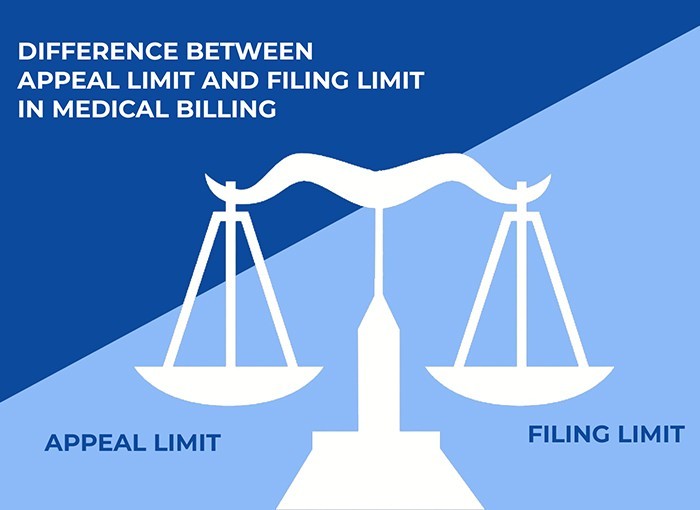Difference between appeal limit and filing limit in medical billing
In medical billing, a timely filing limit is crucial because of the deadlines set by the insurance companies for the service rendered. If a claim gets submitted after the deadline, it gets denied as the timely filing limit expires, and you could lose some serious revenue. The denial code CO29 explains the expired time limit. Health insurance companies have their guidelines, and usually, the timely filing limit ranges from 30 days to 1 year from the day of service. You can find timely filing limits under the claims section in the provider manual.
The insurers are not responsible for late claims. As a provider, it is your responsibility to understand and follow each payer’s guidelines. The claim denials can happen due to incorrect information either shared by the patient at the medical office or typo mistakes by the biller or copied incorrectly.
How to Reduce These Denials?
Ensuring the team is familiar with the limits for the insurer before your patient visits your office will help in submitting claims on time without losing revenue.
Even after submitting a timely claim, you can still receive CARC 29 (Claim Adjustment Reason Code). In reality, sometimes, the insurer lost or never received the submitted claim. In this case, a timely filing report by the clearinghouse lists the claim submission date to the payer and the clearinghouse. Submit this report to the insurer as an appeal to overturn the denial thus you don’t lose money.
Key Differences Between Filing Limits and Appeal Limits
Here’s a table summarizing the key differences:
| Feature | Filing Limit | Appeal Limit |
| Definition | Deadline for initial claim submission | Deadline for appealing a denied claim |
| Stage | Initial claim submission | Post-claim denial |
| Consequence | Claim denial | Loss of appeal opportunity |
| Importance | Prevents initial claim rejection | Allows for reconsideration of denied claims |
How to Manage Filing and Appeal Limits Effectively
The proper handling of filing and appeal restrictions depends on a well-organized system. Here are some strategies:
- Medical Billing Software enables automatic management of both filing and appeal deadlines in billing procedures. These systems offer notification systems along with time-related alert functions to help maintain proper deadlines.
- Develop uniform policies together with procedures that should streamline claims submissions and appeals collection. Healthcare providers must document the specific requirements for filing and appeals which each payer demands.
- Staff members who handle medical billing must receive complete training about correct filing and appeal practice. The healthcare industry needs continuous training to maintain awareness about payer requirement modifications.
Impact of Missed Deadlines
Healthcare providers must face severe financial penalties because of their inability to meet filing deadlines and appeal deadlines. When a practice fails to submit or receive payment on benefits claims the practice loses out on revenue which decreases its financial success. Regular non-payments that arise from late submission of claims will result in severe financial issues which might put your medical practice at financial risk.
The absence of timeliness in meeting deadlines causes direct negative outcomes for both financial success and healthcare delivery. The delay in reimbursement reduces a provider’s capacity to acquire new medical equipment along with employing additional staff and service expansion. Patient care quality suffers because of this situation.
Appealing in Medical Billing
An appeal is a request to reconsider the claim with supporting and rational documentation. As a provider, it is good to know how the appeal process is different from a request for follow-up in case of claim denial for timely filing. You can only appeal if you have a valid reason for not submitting the claim in the first place. Otherwise, it is more difficult to appeal. With an explainable reason, it is most likely to be allowed, in that case, to submit claims as efficiently as possible to get paid. The law permits you to file an appeal, and as a denied claim, it will get a second look from the insurer who wasn’t involved initially.
To illustrate, if the patient was not sure about the insurance coverage and stated that they didn’t have any plan. Later found out that they could be covered and thought of mentioning them after the claim submission. That calls for an appeal after the filing deadline. Write an appeal letter explaining the reason for the delay, and if there was any way for timely filing claim submission, the chances that the insurance claim gets denied. If you have a robust system in place and the documentation provided supports the claim. You will be able to appeal quickly, and the timely filing will be waived. Be sure to check the state’s pay statutes to avoid claim stalling. You can always ask for help, filing an appeal through an independent third party so that you get paid for the rendered services.
Conclusion
Medical billing success depends heavily on the proper comprehension of how appeal limits differ from filing limits. Medical practices need to adhere strictly to deadlines because this practice ensures maximum reimbursement and positive experience in the revenue cycle and healthcare financial stability. Medical providers who develop successful deadline management systems will reduce claim rejections while improving financial stability to provide better patient care.
Medical billing practices prioritized in advance constitute the core components needed for successful healthcare organization growth. Timely reimbursement of medical services depends on payer requirement knowledge combined with resource utilization in medical billing processes. The achievement of any healthcare practice depends on strong medical billing performance.




